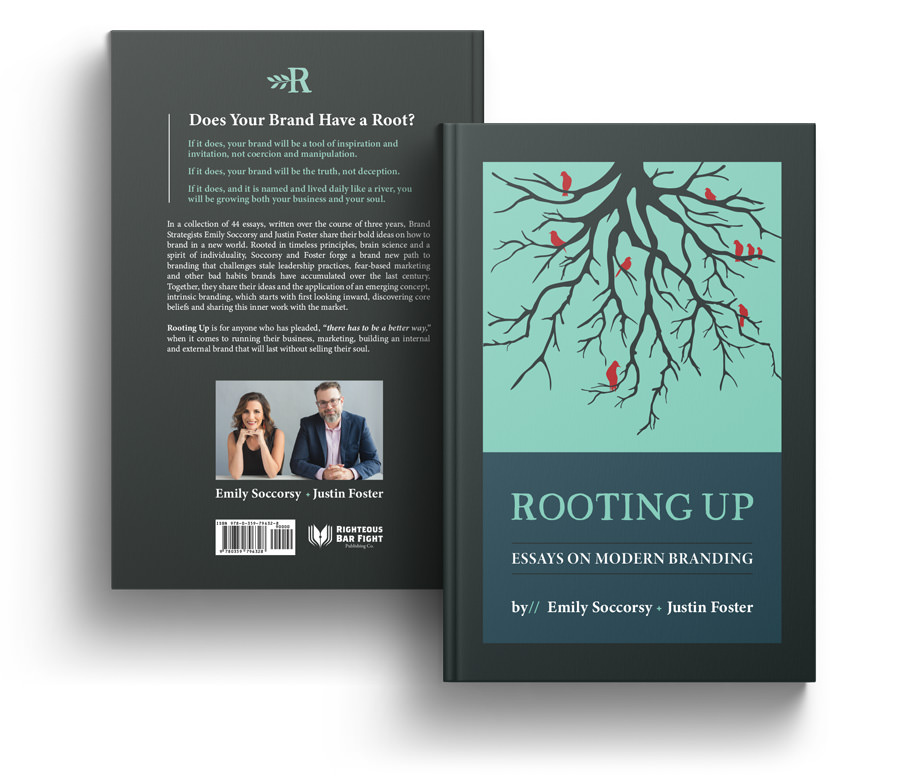Filed Under: 21st Century Branding, Beliefs-Based Branding, Intrinsic Branding, Leadership
We heart entrepreneurial people. We heart them wherever they may be, and whenever they might find us.
In the last year, we’ve seen an increasing number of what we term ATLs, or “about-to-launch,” folks who have finally found the corporate structure too oppressive to their souls to abide any longer. As they prepare their escape, they reach out to us. We meet at the junction and help these ATLs plan their next, more meaningful dedication of intellect, effort and purpose — what we would simply call the launch of their brand.
In every case, it’s an absolute pleasure to help them define their mission, craft their message and coach them to become a brand.
But we’ve also learned that corporate habits are hard to break. That the linear structures and rigid linear-ism of corporate life can run counter to entrepreneurial progress — even for those seeking greater freedom and control in their work.
In the years to come, there will only be more of these ATLs finding their footing.
Entrepreneurism in America has been on the steady incline since 2010 since it’s precipitous drop following the economic crisis of 2008-09. In 2015, nearly 680,000 new businesses were started, according to the United States Department of Labor.
Like immersion into any culture, corporate culture shapes your thinking, conditions your responses, informs your behavior. In a corporate environment, getting along and getting things done is by necessity a group effort. Pile on top of this corporate politics, market pressure, shareholder value — and you learn how to bite your tongue, lessen your true self and “do what’s best for the company.”
If you find yourself in the good company of ATLs, we encourage you to take some time to consider how your corporate habits will either support or hinder your entrepreneurial endeavors.
We’ve observed three pesky behaviors deeply ingrained in our budding heroes, which tend to block brands and stall progress.
Using a map but not a compass
Serial entrepreneur and thought-leader Srinivas Rao uses this metaphor in his book “The Art of Being Unmistakable.” He points out that corporate life is all about the map: knowing where you’re going, planning a route, following a plan. In the entrepreneurial life, there is rarely a map, but there is a compass. In our language, this compass is your Mission and your Root Belief. When you get lost (and you will!), your Mission and your Root Belief are your true north. When you need to make a decision, your compass will tell you which way to turn. To put it in more spiritual terms, corporate life is about the mind with a bit of heart. But the entrepreneurial life is about the heart with a slice of your mind. Knowing your compass of Mission and Root Belief will instill a deep conviction and a sense of certainty. It’s this clarity that fires up the entrepreneurial spirit you need to succeed.
Indecisiveness
“The bold move is always the right move” is a phrase credited to several historical figures. But it also serves as an entrepreneurial mantra to counter the conditioned hesitancy and cautiousness learned in corporate life. Waiting is a tolerated necessity in big business – but if you take this habit into your entrepreneurial venture, your brand will get trapped in the valley of indecision. In the corporate world, confidence comes from competence. In your new world of being an entrepreneur, confidence comes from decisiveness. This doesn’t mean being brash or foolish. It means the confidence you so yearn for is on the other side of action. Even small decisive steps are going to produce some result.
Overuse of consensus-building
In the corporate world, one must be well-versed in campaigning. No significant initiative will be successful in a corporation without internal buy-in. That requires the champion of an idea to build internal agreement and support for the given idea. This means asking people to weigh in, taking into deep consideration all parties and making concessions and revisions designed to condition an idea, usually so it is less daring and safer — just to get the consensus needed to proceed. The opposite is true in start-up entrepreneurial efforts. Taking time to build total consensus among all stakeholders is a waste of time because it keeps you from failing fast, which is the best way toward entrepreneurial progress. Secondly, you may not have assembled reliable stakeholders. Those you are turning to may or may not share your vision, your passion and your understanding of your market. This is not to say you should entrepreneur in a bubble. But consensus-building with friends, family members, the guy in HR you used to work with five years ago or an acquaintance in a similar field is at best distracting, and at worst, is counter productive and wasteful.
If you are one of these intrepid ATLs, take heart!
There’s much from your corporate life that will serve you well, including understanding processes and systems, building high performing teams, and delegating and prioritizing – among bountiful others.
Just remember: what you became to make it in the corporate world must be left behind in order to make room for a new you, the real you, the brave, decisive and passionate you — the entrepreneurial you.
Emily Soccorsy + Justin Foster are cofounders of the intrinsic branding practice known as Root + River. Together with their defiantly different clients, they uncover then articulate the foundational elements of the brand. Then, they provide brand strategy and brand coaching as the brand is rolled out internally and externally. Obsessive about language and differentiation, Emily + Justin are also authors and speakers. Follow @rootandriver @fosterthinking and @emilyatlarge.
